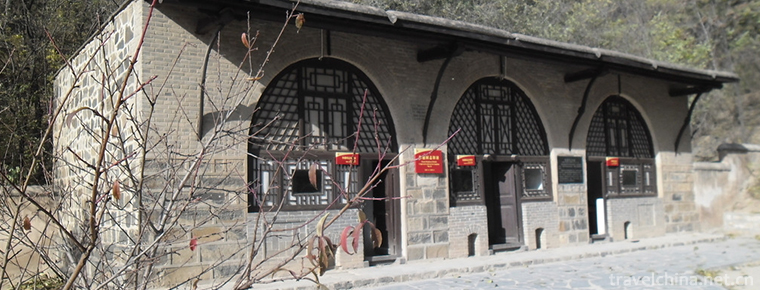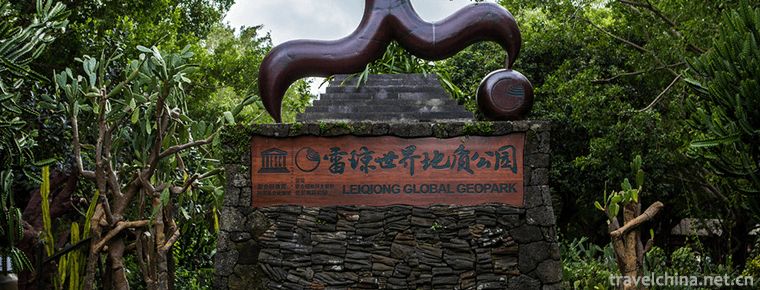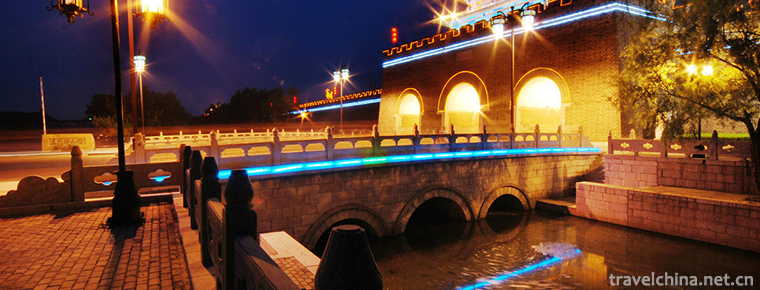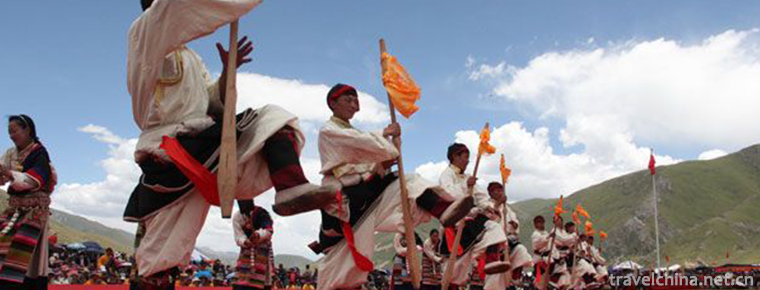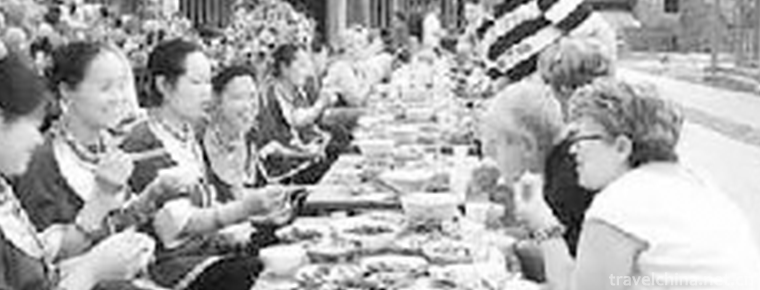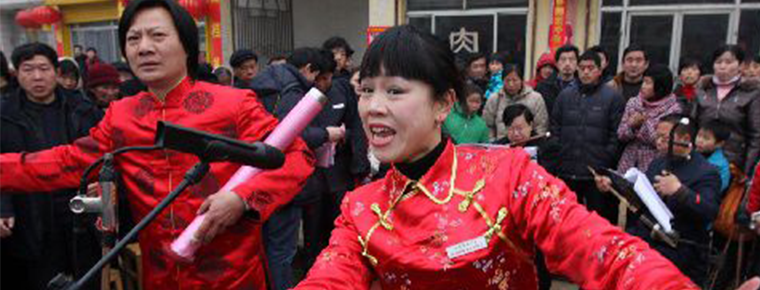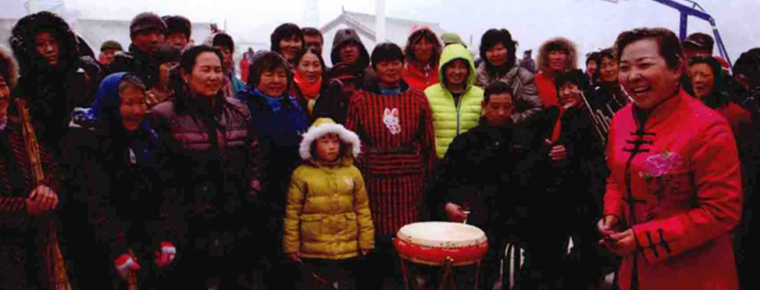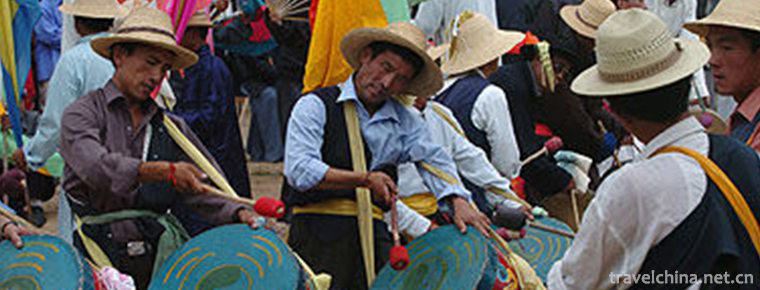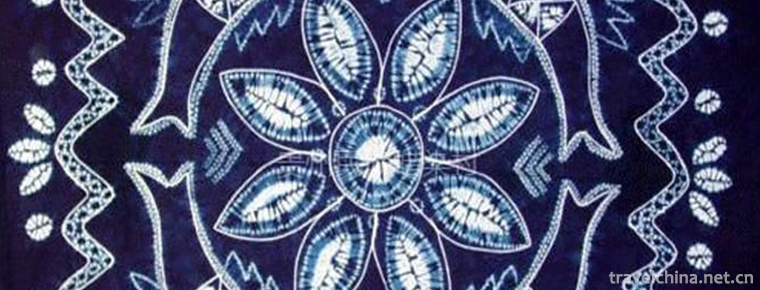Month also
Month also
Dong people's "moon" means collective visiting, which is a social custom in Dong village. The young men and women in one village of the Dong nationality visit another village according to the agreement. During this period, they will hold activities such as competitions of Lusheng and antiphonal songs. "Yueye" is popular in Congjiang, Rongjiang, Sanjiang, Longsheng, Tongdao, especially in the southern part of Liping County and the northern part of Congjiang County.
During the Dong Spring Festival, "Yueye" (also known as "Ye Xuan Nian") is the most grand and solemn, and "Ye Xuan Nian" is generally composed of song troupe, Lusheng troupe and Dong opera troupe. In the process of walking through villages and stringing villages, Lusheng Team will play different pieces according to different occasions, including songs for crossing villages, announcements, entering villages, blocking roads, opening roads, blessing songs, farewell songs and so on.
On May 23, 2011, the month was also approved by the State Council to be included in the third batch of national intangible cultural heritage list.
historical origin
Due to the lack of historical materials and documents, we can not understand the whole social life of Dong people in ancient times. We can only understand the general situation of Dong people from some popular epics, stories, legends, ballads and some customs in real life. The social history of Dong people is still in the stage of primitive social development until the Tang Dynasty. In ancient legends and ballads such as The Origin of Man and The Riverside of Zugong, it reflects the historical facts of the primitive society's intra-clan marriage system and people's struggle against nature. Until now, many Dong villages still have strong remains of the primitive commune.
The General Survey of the Dong Nationality records that in the primitive society, the ancestors of the Dong Nationality gradually developed into hunting and congratulating activities among families, tribes and tribes, villages and villages during their struggle against nature. From this historical fact, it can be inferred that the activities of fighting against nature and alliance were the earliest form of "Yueye" of the Dong nationality before the Tang Dynasty. "Song Shi, Zhu Man of Southwest Xidong" recorded that "at the time of farm gap, one or two hundred people sang for Cao, holding hands, and several people blew Sheng in front of him." In addition, Liu Qin's Quyang Frontier Defense Examination of Ming Dynasty recorded that "thousands of people clashed and hundreds of people paid for each other, all of them had different nationalities, but they could not get along with each other by making a curse offer." This shows that the Dong people's "Yueye" was a popular social activity from Song Dynasty to Ming Dynasty, with cultural exchanges as its main content. With the continuous progress of material civilization and spiritual civilization, the primitive hunting activities gradually evolved into social collective activities with cultural exchanges as the main content.
"Yueye" experienced the gestation period in the struggle between labor and nature before Tang Dynasty, and the Dong culture, whose main content was Dong songs, gradually prevailed in Dong village villages in Song Dynasty, so "Yueye" gradually matured. From the 1960s to the 1970s, Dong culture suffered a blow. From the 1980s to the early 1990s, it became popular and gradually disappeared in the late 1990s.
Liping's location is known as "the extreme edge of Chu and Yue", "the throat of Baiyue". Because of the inconvenience of traffic and the historical location of the junction of Chu and Yue cultures, the so-called "those who enter the territory have a false name" is difficult for the central dynasties to control. It is precisely such geographical features and administrative location that make the Dong region have a long period of space for self-cultural development, especially in Liping, Congjiang and other southern Dong areas far from the Han family, which still preserve typical and unique Dong culture.
Festival Contents
Major activities
The scale of "Yueye" is uncertain and can be attended by men, women, old and young. When they went, they were all dressed in festival costumes. The "Song Team" and "Lusheng Team" went with the theatre troupe. The main village is served with wine and meat. The guests sing Dong Opera or Sailusheng in the daytime and Dong Song in the evening, and they celebrate together for three to five days. When leaving, the main stockade will also give gifts to pigs and sheep. Depending on the harvest, the next year or several years later, this village will return to Pizhai. "Yueye" only takes place after the autumn harvest or during the Spring Festival to celebrate the harvest and the festival, and at the same time not to miss the farming season. "Yueye" has a lot of contents, mainly including the following seven kinds:
Yueye Opera
"Yueyexi Opera" (as a performer), that is, to sing Dong Opera as the main platform, while carrying out a variety of folk cultural exchanges of collective social activities, generally in the first month of the lunar calendar. Its main activities are to sing Dong Opera in Jiazhai and Yizhai, to sing Dong songs, to make friends with young men and women, and to visit relatives and friends of the elderly. After the Spring Festival, the Opera Troupe master or singer of the song troupe advised Zhai Lao to go to which village or several villages to sing operas and songs. After the village old man consulted and allowed, the two Lahan (young men) took the red Posts written by Zhai Lao and went to the designated village to worship and paste them. When the poster arrives at the designated stockade, he must go downstairs to blow three Lusheng songs, and then send the posts to the veterans of Yizhai stockade. After receiving the letters and posts, the old people in Yizhai village arranged for the Lahan people in Yizhai village to prepare good wine and dishes to entertain the guests while convening other old people's discussions. If you agree to accept Jiazhai's "Yueyexi Opera", you are invited to present three pillars of incense, three glasses of wine and three bows to Sa Tang, the goddess of the Dong Nationality, in order to show respect for ancestors and people in the village (in Dong Zhai, worship of Sa before entering the village is a very serious ceremony, and all kinds of activities must be held in the month as well. Rituals). Then the red posters will be posted on the main entrance pillar of the Drum Tower to inform the villagers of the whole village that one day a village will come to "Yueye Opera" to prepare the families. When he was full of wine and food, Zhai Lao arranged for two Lahan people to blow Lusheng to send letters and posts.
Send it out of the stockade.
After getting a positive reply from the old people in Jiazhai, they organized the whole village to make positive preparations. On the same day in January, the men, women and children of Jiazhai went out together. Before leaving, Zhai Lao went to "Satang" to invite "Sa" to protect him. Then Lahan and the girls played Lusheng, played gongs and drums, and invited "Sa" to the drum tower. First they sang three songs of "Sa" and then three songs of "Sa" to protect them. After everyone finished singing, three iron cannons sounded, so all the people began to go to Yizhai. When approaching Yizhai, he played Lusheng, drums and gongs to show his message. Yizhai has long called all the people of Yizhai to the village entrance to set up barriers and sing roadside songs to welcome visitors. The guest sings the road song, then the Lahan girl in the main village beats gongs and drums, and plays Lusheng to lead the guests to the Drum Tower of Benzhai, turning three times around the four pillars of the drum tower together. The guests rest in the drum tower temporarily .
Receiving guests, most of them enter the house. Each family arranges its own meals without making specific provisions. Each family tries its best to do decently so as to expand the reputation of the village.
Guests usually sing in the main village for three days. If the opera is very good and the singing is pleasant, the main village will stay for two or four more days. On the day of "Yueye", the main theme of the host and guest is to sing Dong Opera in the daytime. After dinner, the host and guest go to the drum tower to sing "Galao" (Dong nationality song, Lahan song of the host village and Lahan song of the guest village, Lahan song of the host village and the girl of the guest village) or step on the singing hall together. Singing "Galao" (Dong nationality song) or stepping on the singing hall will last until late at night. In the second half of the night, the young men in the main village will find the girls in the main village to sing love songs. The young men in the main village will also find the girls in the main village to sing love songs. This is the famous Dong Yuetang love song.
So three or five days later, the Hakka Village will have to say goodbye. When leaving the Hakka Village, the households in the main village wrapped glutinous rice, salted fish and bacon on straw for lunch on the way. Before departure, guests and hosts went to the Drum Tower of the main village to sing a trampling song; both sides praised each other with songs, and then sang a farewell song. The young men and women in the main village send their guests to the gate of the village, and give them gifts tied to towels with red and green feathers as a souvenir.
The moon is old.
"The month is also old" (as guests), generally in the first month of the lunar calendar, the number of people for the objective two villages of all men and women, old and young. "The moon is old" is mainly composed of singing Dong's big song, stepping on the hall song and young men and women singing love songs. These belong to the friendship between the old and young people in Jiazhai and Yizhai. Jiazhai sends out many posts and sends them to them. Yizhai receives an invitation to organize theatre troupes or lion teams to attend the meeting. As soon as the guests arrived, the host village organized Benzhai girls to greet the guests at the gate of the village with textile machines, farm implements and other objects, and the guest sang a song of road blocking. After singing, the main village sounded three iron cannons, then beat gongs and advocated Lusheng, guided guests to the "Sa-year-old" altar, held ceremonies, and then introduced the drum floor to step on the auditorium. The guests and hosts each sang three songs. The lyrics were "Sa" and "Welcome" and "Apologize". Later, during the day and night, or acting, playing lions, bullfighting, or Jiayi two villages men and women stepped on the hall "Doye" (song). Guests stay for three or five days (all singular) and let go. When the guests arrived, every household in the Hakka family used straw bags or glutinous rice balls to tie up the Chai cakes. Each round of rice and cakes was tied with a string of flowers to tie up three to five eggs dyed red and green. They were especially hospitable. They also bundled chickens and ducks to give each other, and the whole village sent a group or a sheep or pig or a cow. Haruki returned to the guest house to give him a towel. A kind of gift is called "tail", which allows guests to pick and pick up without empty hands. When seeing off guests, the whole village poured out, firecrackers, gongs and drums, played Lusheng, and welcomed them out. Usually the next year or a few years later, Yizhai felt the conditions were right and sent out invitations to invite Jiazhai to return guests.
Every month is free.
"The month is also free" (as a social guest), in the Spring Club to rush out, Jiazhai received Yizhai girls collective guests, girls come, Luohan warm hospitality sooner or later, in the daytime to step on the hall to sing songs, at night to sing the month. Such "moon" girls do not return, but go to each other's girls by their brothers.
Yueye Left Building
"Yue Ye Zuo Lou" (as a guest of He Gu Lou) is usually held at the beginning of the first month. When the new drum tower was inaugurated in Jiazhai, the men, women and children of Yizhai poured into the village to congratulate them. The number of people and the reception and reception were the same as helping the guests, but the activities were more enthusiastic. Yizhai organizes people to make "Nama" (that is, make faces), consisting of dozens of people, including "officials". They ride horses on high school stilts, dress up as warriors, businessmen, beggars and so on. They carry couplets of congratulations, beat gongs and drums, play Lusheng and set off firecrackers to congratulate them. In addition, a team of girls was organized to wear festive dresses. When Jiazhai attracts visitors to the Drum Tower, they turn around the Drum Tower, make various interesting performances, distribute salted fish, and the girls scatter rice flowers. Jiazhai girls stop official sedan chairs and sing for passing money. This kind of guest usually only stays for one day. The main part of the day is trampling on the singing hall and singing greeting hall songs. This kind of guest can only return to Yizhai when the drum tower is newly built or renovated.
Yue Yeding
"Yue Yeding" (as a group of ordered relatives), also known as girl Luo Hanke. This activity lasts for a long time, sometimes for several months. It is the best time for both young men and women and their parents to get to know each other. There are stockaded villages and stockaded villages, and there are surnames and surnames. Although they are girls, they are all run by the elderly. Firstly, after the old people of two villages (or two surnames) intend to have friendship with each other, they signaled to Luohan the girl that when rice and rice were in the field, Jiazhai girl cut off bamboo leaves with bamboo roots and left three or five or seven branches, each with a cotton and a red pepper tied to the tip of each branch, and selected a roadside field of Luohan's family in Yizhai to insert quietly. It is called table. If three branches are small, only part of the girls are carried out by Arhats; if more than five branches are carried out by whole stockade or full surname, so that even the children holding them are listed as girls and Arhats. After seeing Luohan in Yizhai, he made an appointment with chickens, ducks and geese to visit Girls'Village (the girl had already been informed by secret news) for a monthly visit. At first, the girl and her parents did not admit to inserting "watch", saying that they did not dare to climb high doors. After many nights of singing, sitting on the moon and cooking dinner, the girl and her parents were invited to dinner before the woman admitted that she had the intention to climb. High portal and insert "table". So the two sides chose the auspicious day to formally erect the "big table". "Big watch" is tied up by girls. Seven bamboos are cut off from the original seven branches and the leaves are trimmed. Each girl presents one or two kilograms of the best and whitest cotton, which is connected one by one with white thread. Then each bamboo branch is wrapped up, and some bamboo tips are tied with several colorful phoenixes that are ready to fly.
On the "big watch" day, Luohan in Yizhai killed pigs and prepared wine, beat gongs and drums, played Lusheng, firecrackers and iron cannons, and carried them to the field. Accompanied by her brothers, the girl in Jiazhai carried the "watch" tied up and wrapped in the finest white cloth she had woven. She also beat gongs and drums, played Lusheng, set off firecrackers and sent them to the field, which was inserted into the table. The name of the grain is "shriveled rice field". After the erection, the two sides gathered for a picnic and praised its "watch". Later, they went home separately, and when the ears were 89 percent mature, the two sides agreed to choose the right day to go back to the table. On the reverse table, the grain was folded up to the woman's home. On that night, her parents and brothers had a big banquet with their guests. The name was "son-in-law's presence" and "rice" was eaten at night. Later, Luo Han went to Girl's Village to sing and sit for a month, to talk about love, until the next year, at the beginning of the first month to choose the auspicious day of "Lunding" (that is, to end the booking of relatives). Yizhai invited Jiazhai girls and brothers and fathers to visit their homes, stepped on the hall to sing songs, and ended the communication on the 3rd to 5th day. Through this kind of activity, many young people get married and become lifelong couples.
Yueyelun
"Yueyelun" (to be a Lusheng guest) is usually held during the Jiaxun Festival and the Mid-Autumn Festival. The activities are mainly about the Lusheng contest between the two villages. At the same time, cultural and social activities are carried out through singing, stepping on the singing hall and congratulating on the harvest. Take Lusheng Saiping, Jitang, Zhaoxing Township, as an example. It is held every two years, on the day of Mid-Autumn Festival. There are Zhaoxing, Pilin, Cenyan and Longyao from the county, Luoxiang, Qingyun and Xin'an from Congjiang, and dozens of Lusheng teams (20 to 50 Lusheng players per team) from Dong Village and Miao Village from Fulu Township in Sanjiang County, Guangxi. They gather on a flat to carry out Lusheng Friendship Competition, and their audiences are crowded with people at every time. More than ten thousand people.
On the day of the competition, the host Jitang and Dengjiang villages, Lusheng team entered the plateau early, and sent experienced elderly people to the top of the high slope to listen to the sound evaluation (because Lusheng Village is mainly crowned by the sound outstanding), so as to win the competition. When each visiting team arrives at the edge of the flat, it first plays three landing tunes, the host immediately fires three iron cannons, and then makes three friendship singles with the visiting team to greet them. Then firecrackers were fired to attract tourists to the playground and compete with other teams in singles. Around noon, the Lusheng team arrived, and after the team and team single matches were widely carried out, two or two hundred girls in the host village, dressed in festival dress, holding parasols, carrying red paint buckets on their shoulders, filled with sweet wine that had already been brewed, entered the arena under the guidance of the small Lusheng, then played the small Lusheng and firecrackers. One by one to each Lusheng passenger team, dedicated to the Lusheng players. After eating the sweet wine, the whole group competition, while playing three songs in concert. After the concert, the Lusheng players of the visiting teams bought candy, filled with sweet wine barrels, blew Sheng and fired guns to the girl to return, expressing their gratitude. The host then awards the flag and commemorative flag (commemorative flag is issued for all participating teams) according to the level of listening. At the end of the competition and the end of the competition, village Lacun was a guest and people were invited to be a guest. In the Lusheng competition, the Lusheng teams of the two villages usually made friends at the Lusheng meeting. After the young people proposed that the two villages agreed to hold the meeting, and the "Moon also Round" began.
Respect for the moon
"Yue Ye Jing" (Jing Zhai Ke), meaning to help the host village honor guests, the biggest feature of this form is that when two villages are carrying out "Yue Ye", the other village will send letters and pastes to the host village. After receiving the posts and agreeing with the old villagers, the main stockade will paste them on the doorpost of the Drum Tower in the future to inform the villagers that a stockade will come to "respect you".
The form of "Moon Respect" is the same as the previous ones. They are all cultural activities such as singing Dong songs, Dong Opera, stepping on the singing hall, singing love songs, making friends and visiting relatives. But it is also different from the previous "month also" comparison. First of all, the postage of "Yueyexi" and "Yueyeding" is that two young men who can talk and sing are appointed by Zhai Lao to send the postage directly to the home of Zhuzhai village; the "Yueyelun" is that the main village sends the postage to the Hakka village, while the "owe" is that five to seven young people are appointed by Zhai Lao to pretend to be flower faces and take advantage of the young men and women in the main village and the Hakka village. When they were stepping on the auditorium, they held up red stickers, blew Lusheng, rushed into the auditorium in a frenzy, set off three firecrackers first, then blew Lusheng around the auditorium, first running three laps to the right, meaning first respecting the master, then three laps to the left, respecting the guests. Then he went to the front of Zhai Lao who was sitting in the middle of the auditorium and kowtowed three times. He put up the posts and finally blew three Lusheng songs before leaving. Secondly, there are differences in the time of "Yue Ye" between "Yue Ye Opera" and "Yue Ye Ding" and "Yue Ye Lun", which are less than three days, more than five days, and also seven or nine days. The "month also respects" is only one day.
Festival-related
"Yueye Opera" mainly uses Erhu, gongs, small six-pipe five-tone Lusheng and so on.
"Moon is also old" mainly uses Erhu, gongs, small six-pipe five-tone Lusheng, Pipa and so on.
"Yueyelun" mainly uses large six-pipe three-tone reed Sheng, medium-sized six-pipe three-tone reed Sheng, small six-pipe five-tone reed Sheng, as well as Pipa and Dong flute.
"Yueyeding" is mainly used for calf-leg piano.
Road-block song, which is sung by Dong people when they greet and send off guests, is mostly used in the occasion of "the moon". The duration of "Yueye" depends on the content, and the number of participants is usually one representative. Leaded by prestigious people in the village, they visited friendly villages collectively. When the guests of Jiazhai are approaching Yizhai, the people of Yizhai will welcome them at Zhaikou. At the same time, they will set up many roadblocks with daily production tools or living utensils. Both sides will open their song battles and sing blockade songs. The home team asked questions with songs, and the guest team answered them with songs, answering and removing a roadblock at a time. If the answer is wrong, the visiting team will set off firecrackers to express its apology and respect. The host team will remove the roadblocks, welcome visitors into the village and participate in various activities, such as performing Dong Opera, singing Dong Song, dancing dragon and lion, and competing Lusheng.
At the end of the month, the main stockade gathered a team to welcome the guests and sent them to the stockade and sang a roadside song to show their retention. Dependence on each other shows solidarity, friendship and friendship among compatriots.
Festival characteristics
1. Mass character. The collective social activities with villages and villages, stockades and stockades, fangs and fangs as the main body, involving both men and women, young and old, are a complete mass cultural activity, which also reflects the spontaneous characteristics of Dong culture.
2. The diversity of cultural display. In the "Yueye" activities, cultural display is the cornerstone, no matter what kind of "Yueye", the displayed culture includes Dong economy, religion, ethics, art, technology and so on.
3. The inheritance of Dong culture. On the one hand, "Yueye" enables the elders of the Dong nationality to actively transmit the Dong nationality songs and other Dong culture to their descendants, so that they can be praised by the people of the Dong nationality in the public platform of "Yueye". On the other hand, the young people also actively and consciously learn their own national culture, so that the Dong culture can be effectively inherited and developed.
4. Symbolism of national unity. The purpose of the "Yueye" campaign is to promote unity among villages and deepen mutual understanding between young men and women.
5. Obvious seasonality. "Yueye" only takes place during the first month after the Spring Festival and during the leisure period after the autumn harvest. It chooses these two seasons to carry out activities. First, to celebrate the harvest and wish for a good harvest in the coming year. Second, it is the Dong people who live in the leisure period of both seasons and take farming as their main source of livelihood.
Inheritance value
Dong Yueye, with strong Dong characteristics, occupies an important position in the social, cultural and spiritual life of the Dong community, and is an important platform for the natural display of Dong culture. It is the most important way to exchange ideas, culture and society between Dong villages, Dong ethnic groups and other ethnic groups. Its value mainly includes:
(1) Historical value. The "Yueye" of Dong Nationality is a social activity evolved from the organization of Dong Nationality. This activity is a historical relic of alliance with nature in primitive social life. The "Yueye" retained after abandonment is a microcosm of the social development of Dong Nationality. It is of great significance to the study of Dong society, history and culture.
(2) Academic value. Taking villages as the main body and cultural exchanges as the link, Yueye carries the inheritance and development of Dong culture, and bears the memory of Dong culture. To excavate, rescue and protect the "Yueye" of the Dong nationality is not only of great academic value to enrich and inherit the Dong culture, to study the national mentality and historical culture of the Dong nationality, but also to promote the enrichment and perfection of the world cultural history.
(3) Practical value. In the social life of the Dong people, the activities of "Yueye" promote and promote the development of the whole Dong culture by singing together, making friends with songs and promoting the feelings among ethnic groups and promoting the comprehensive development of culture, economy and society. She is closely related to various customs and is the epitome of the history of Dong's social development. At the same time, "Yueye" strengthens the unity of ethnic areas, promotes the construction of spiritual civilization in Dong's areas, enriches the cultural life of the people, improves the quality of the people, and promotes the economy, culture and society of Dong's areas. The all-round development of the society has constructed a harmonious socialist society .
Endangered status
With the diversification of forms of social activities and the diversification and marketization of forms of cultural exchanges, the social basis on which the month depends for its survival and development has changed. Especially with the development of market economy and the acceleration of work rhythm, the monthly activity positions between villages and ethnic groups are gradually shrinking, and the grand scene of Dong culture display in the past is no longer good-bye.
Dong culture as a whole is facing the strong impact of foreign culture and market economy. There are fewer and fewer platforms for Dong culture to communicate and display in traditional ways. With the increase of migrant workers, they are facing great pressure to improve their lives and environment. They can not arrange social activities for three days, five or seven days or even nine days.


-
Xibaipo Scenic Area Pingshan County Shijiazhuang
Xibaipo is located in the middle of Pingshan County, Shijiazhuang City, Hebei Province, with a total area of 16,440 square meters. It was the seat of the CPC Central Committee.
Views: 148 Time 2018-11-24 -
Beijing Ocean Hall
Beijing Ocean Hall, located on the North Bank of Changhe River in Beijing Zoo, is adjacent to Beijing Exhibition Hall, Astronomical Museum and Capital Stadium in the south. It covers an area of 120,00.
Views: 113 Time 2018-12-26 -
Leiqiong Haikou Volcanic Group World Geopark
Leiqiong Haikou Volcanic Group World Geopark is located in Shishan Town, southwest of Haikou City. It is only 15 kilometers away from the urban area. The Expressway .
Views: 149 Time 2019-01-29 -
Sankong Tourist Area in the Old City of the Ming Dynasty
Qufuming Old City Tourist Area in Jining: World Cultural Heritage, one of the three holy cities in the world, national AAAAA-level tourist attractions, National Scenic spots.
Views: 241 Time 2019-02-07 -
A harmonic
A harmonic, also known as Dabu Ah Hsiang, means "the song of laborers", originated from a form of labor called "Da Ah Hsiang" among Tibetan people..
Views: 233 Time 2019-03-29 -
Dong medicine
Dong medicine is a bright pearl in the treasure house of Chinese medicine. The Dong people living in mountainous areas for generations have accumulated experience in treating various diseases and form.
Views: 88 Time 2019-04-27 -
Hu Ji Shu Hui
Hu Jishu Fair is a traditional folk art fair that rose and took root in Huji Town, Huimin County, Shandong Province. Huji is the largest market town in the southeast of Huimin County.
Views: 96 Time 2019-05-03 -
Jingdong drum
Jingdong Drum is a traditional rap art originating in Sanhe, Xianghe, Pinggu and Baodi of Hebei Province. The main instruments, in addition to the singer's left hand with copper plate,.
Views: 106 Time 2019-05-07 -
Naton Festival of the Turkish Nationality
Naton is a temple fair where the Tu people in Sanchuan area of Minhe County, Qinghai Province perform Nuo Dance (the first dance) and Nuo Opera (the mask dance) in order to dispel diseases and calamit.
Views: 252 Time 2019-06-23 -
Tie dyeing skills
Tie-dyeing, known as Zha Val, Ge Val, Jia Val and Dye Val in ancient times, is a traditional and unique dyeing process of Chinese folk. A dyeing method in which fabrics are partially tied up so that t.
Views: 142 Time 2019-07-16 -
Thanksgiving tower
Baoen tower is located in Baoen tower Cultural Square, Jiangyang District, Luzhou City, Sichuan Province, commonly known as Luzhou white tower. It is one of the cultural relics under key protection in Luzhou city. Its unique "white pagoda dawn" is one of the "Eight Sights of Luzhou"..
Views: 135 Time 2020-10-15 -
History of Dazhou
Dazhou area belonged to Liangzhou in Xia Dynasty and Yongzhou in Yin Dynasty. The earliest indigenous people were the Cong people, who established the state of Cong (now tuxi Town, Quxian county). In the early Warring States period, Ba people migrated fro.
Views: 204 Time 2020-12-20
